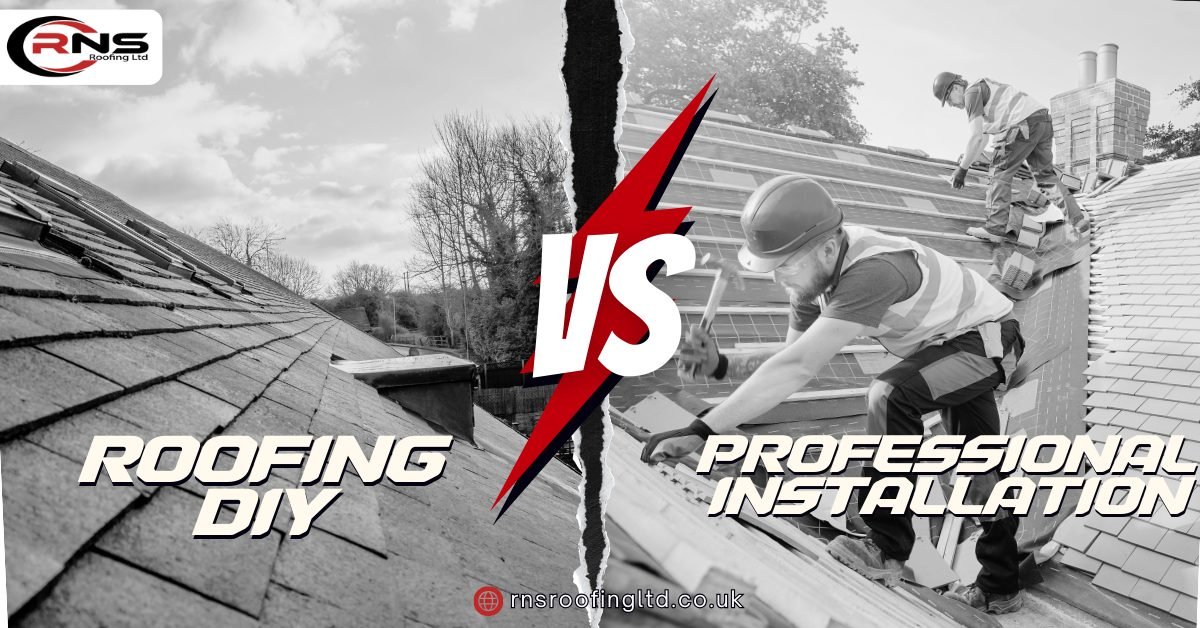So your roof is on its last legs and you need a Roof replacement. As a handy homeowner, you may be tempted to tackle the project yourself and save some cash. After all, how difficult can it be to install some shingles? Before grabbing your hammer and tearing off the old roof, it’s essential to weigh the pros and cons of DIY Roofing Vs Hiring A Professional Roofer.
A new roof is a significant investment, and while a DIY approach may seem appealing, there are considerable downsides related to cost, time, safety, and the quality of the final result. Sometimes, you get what you pay for. This article provides a detailed comparison between DIY roofing and hiring a professional roofer, helping you make the best choice for your home.
DIY Roofing
Cost Savings with DIY Roofing
One of the most attractive aspects of DIY roofing is the potential to save money. By avoiding the labour costs of a professional roofer, you might save a significant portion of your budget. On average, the materials for a new roof could cost anywhere from £4,000 to £8,000, and labour can often double this amount. For those with experience in home improvement, this cost-saving opportunity can be tempting.
While a DIY roofing project can save money, the risks far outweigh the rewards for most homeowners. Unless you have roofing experience, it’s best left to the professionals. Your life, home, and wallet will thank you.

The Risks and Challenges of DIY Roofing
While DIY roofing may seem straightforward, it comes with substantial risks:
Safety Concerns:
Working on a roof is inherently dangerous. Falls from heights are one of the leading causes of injury during home improvement projects. Without the right safety equipment and training, a simple mistake could lead to severe injury.
Hidden Costs:
What may seem like a budget-friendly project can quickly escalate. The cost of renting or buying specialised tools, safety equipment, and disposal services for old roofing materials can add up.
Quality of Workmanship:
Roofing requires specific skills to ensure proper installation. Without experience, DIY projects often lead to poor workmanship, resulting in potential leaks, energy inefficiency, and the need for costly repairs down the line.
Benefits Of Hiring a Professional Roofing Contractor
Hiring a professional roofer to install or replace your roof has significant benefits over attempting a DIY roofing project.
Experience and Expertise
When comparing DIY Roofing vs. hiring A Professional Roofer, expertise is one of the most significant advantages professionals bring. A professional roofer has years of experience and is trained to handle any challenges that arise during the project. They know how to install roofing materials properly, ensuring longevity and durability.
High-Quality Materials and Workmanship
Professional roofers often have access to better-quality materials and know which products work best for your home and climate. They can also secure materials at lower costs through their supplier networks. Additionally, a warranty usually covers their workmanship, giving you peace of mind that your roof will be done right.
Time Efficiency
Roofers work quickly and efficiently, completing a project in a fraction of the time it would take most homeowners. With a professional, you won’t have to worry about leaving your roof unfinished for weeks while you find time to work on it.
Safety and Compliance
Hiring a professional means you don’t have to risk your safety climbing onto your roof. Roofers are trained in safety protocols and have the right equipment to do the job without incident. They also handle all necessary permits and ensure the roof meets building codes, avoiding potential fines or legal issues.
Making the Decision: DIY Roofing Vs Hiring A Professional Roofer
When DIY Roofing May Be Right for You
- You have roofing experience: If you’ve done roofing work before or are confident in your abilities, a DIY approach could save you money.
- The roof is small and straightforward: For simpler roofing jobs, like a shed or garage, a DIY project might be manageable.
- You’re comfortable with the risks: If you’re aware of the safety concerns and willing to invest in the proper tools and equipment, DIY may be an option.
When Hiring a Professional Roofer is the Better Choice
- Lack of experience: Roofing requires specialised knowledge, and mistakes can be costly. If you’re inexperienced, it’s better to leave it to the pros.
- Time constraints: If you can’t dedicate several days or weeks to the project, hiring a professional will save you time and hassle.
- Safety concerns: If you’re uncomfortable working at heights or don’t have the proper safety equipment, hiring a roofer is the safest option.
Conclusion
So there you have it, the pros and cons of tackling a DIY roof installation yourself versus hiring a professional roofing company to do it for you. At the end of the day, you have to weigh all these factors and determine what makes the most sense for your particular situation. You can save thousands if you have the skills, time, patience, and budget to do it yourself. But if the thought of braving dangerous heights and ensuring a watertight result seems daunting, hiring a pro is probably your best bet. The most important thing is that you end up with a roof over your head that you feel confident in and can trust to protect your home for years to come. Whatever route you choose, make sure to do your research, follow the proper safety precautions, and don’t cut any corners. Your roof is worth the investment.
People Ask Questions About Roofing DIY Vs Professional Installation
Is DIY roofing a viable option for all homeowners?
DIY roofing can be suitable for individuals with adequate skills, knowledge, and tools. However, it may not be advisable for complex or large-scale roofing projects.
What are the drawbacks of DIY roofing?
Insufficient expertise can lead to subpar workmanship, potential safety hazards, and costly mistakes. Warranty and insurance issues may also arise if problems occur later.
What safety precautions should I take for DIY roofing?
Prioritize safety by using appropriate personal protective equipment (PPE), securing ladders, and following safety guidelines for working at heights. Always work with a partner if possible.
What are the advantages of DIY roofing?
DIY roofing can save money on labour costs and allow for a sense of accomplishment. It also offers more control over the project timeline and materials selection.

